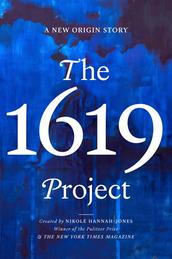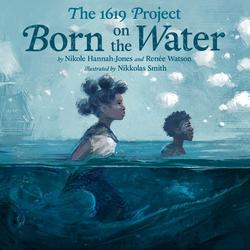
ALA president Julius C. Jefferson opened the session with general association news, including the 100th anniversary of the Newbery Medal (the 100th award was given out during the 2021 Midwinter conference). Since the now-virtual 2021 annual conference was supposed to be held in Chicago, P.J. Maracle, associate librarian at Hennepin County Library in Minneapolis and enrolled member of the Mohawks of the Bay of Quinte located in Tyendinaga Mohawk Territory, gave a Land Acknowledgment to the Ancestral Home of the Three Fires (which includes, among others, the Ojibwe, Odawa and Potawatomi). Cindy Hohl, president of the American Indian Library Association, then introduced Hannah-Jones and Jackson.
 Hannah-Jones said the project's began when she was in high school and took a one-semester Black Studies elective. "It was the first time I ever got any type of extensive instruction on Black Americans.... opening that door just a little bit made me realize there was so much we hadn't been taught--and that was intentional." As an adult journalist, Hannah-Jones wanted to discuss how democracy, capitalism and our political system all have surprising connections to slavery: "Every piece would start with something in our society right now and expose its roots." The work, Jackson pointed out, is "about America... not Black America." Hannah-Jones agreed: "There's American history and then there's Black history. But you wouldn't have American history without Black Americans."
Hannah-Jones said the project's began when she was in high school and took a one-semester Black Studies elective. "It was the first time I ever got any type of extensive instruction on Black Americans.... opening that door just a little bit made me realize there was so much we hadn't been taught--and that was intentional." As an adult journalist, Hannah-Jones wanted to discuss how democracy, capitalism and our political system all have surprising connections to slavery: "Every piece would start with something in our society right now and expose its roots." The work, Jackson pointed out, is "about America... not Black America." Hannah-Jones agreed: "There's American history and then there's Black history. But you wouldn't have American history without Black Americans."
Jackson asked Hannah-Jones how she chose the subjects to cover in the magazine. She said she worked with a group of journalists and editors--including Jake Silverstein, Ilena Silverman, Caitlin Roper, Jamelle Bouie and Wesley Morris--with the knowledge that three main topics had to be in the piece: democracy, capitalism and music. Democracy and capitalism because they are the "two pillars of American society and identity" and both "were built through slavery"; music because "Black music is American music--they are synonymous." The conceit, Hannah-Jones said, was a "commemoration of the 400th anniversary of slavery." They wanted "to show that very little has been untouched by [slavery]."
 Hannah-Jones emphasized, as she has in many other interviews, that "this is not a history, this is journalism.... My essay is memoiristic. I'm making an argument. I'm not creating a work of history. I'm using history to create a work of journalism." This "monumental endeavor" exists, she said, because Americans "haven't grappled with [slavery] and people haven't wanted to grapple with [slavery]." She set out to produce "something powerful." But Hannah-Jones admits, she "didn't know how people would respond to it, frankly." She has been "shocked by what this project means to people"
Hannah-Jones emphasized, as she has in many other interviews, that "this is not a history, this is journalism.... My essay is memoiristic. I'm making an argument. I'm not creating a work of history. I'm using history to create a work of journalism." This "monumental endeavor" exists, she said, because Americans "haven't grappled with [slavery] and people haven't wanted to grapple with [slavery]." She set out to produce "something powerful." But Hannah-Jones admits, she "didn't know how people would respond to it, frankly." She has been "shocked by what this project means to people"
And so, when Jackson asked Hannah-Jones why she wanted to expand it into a book, she said it was for "two reasons: we ran out of copies.... This was a way to ensure broader reach, broader access." But, larger than that, "there were so many other stories that we wanted to tell that just wouldn't fit [in the magazine] and there were some holes." This story is important, Hannah-Jones pointed out, because "our role [Black people] has been to make this country live up to its ideals.... We are central to almost everything in this country and we deserve recognition for the role we have played." She reminded viewers, "The biggest resistance of all [was] staying here instead of leaving this country after slavery." --Siân Gaetano, children's and YA editor, Shelf Awareness

